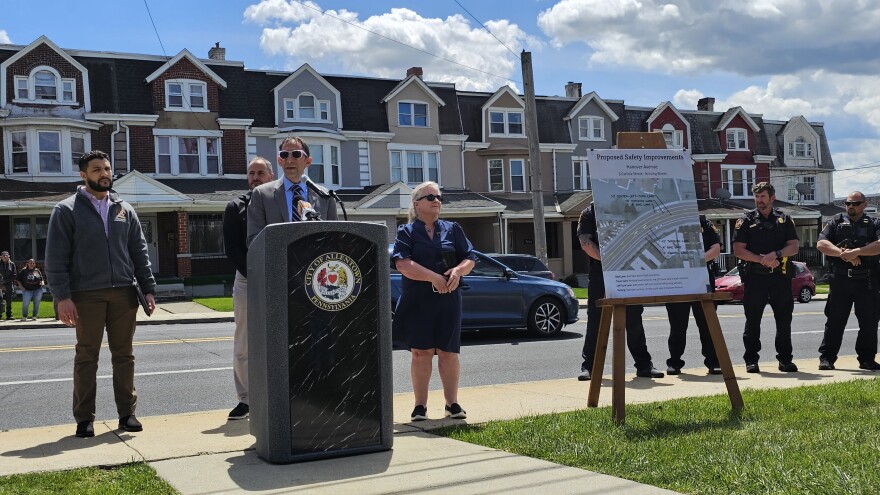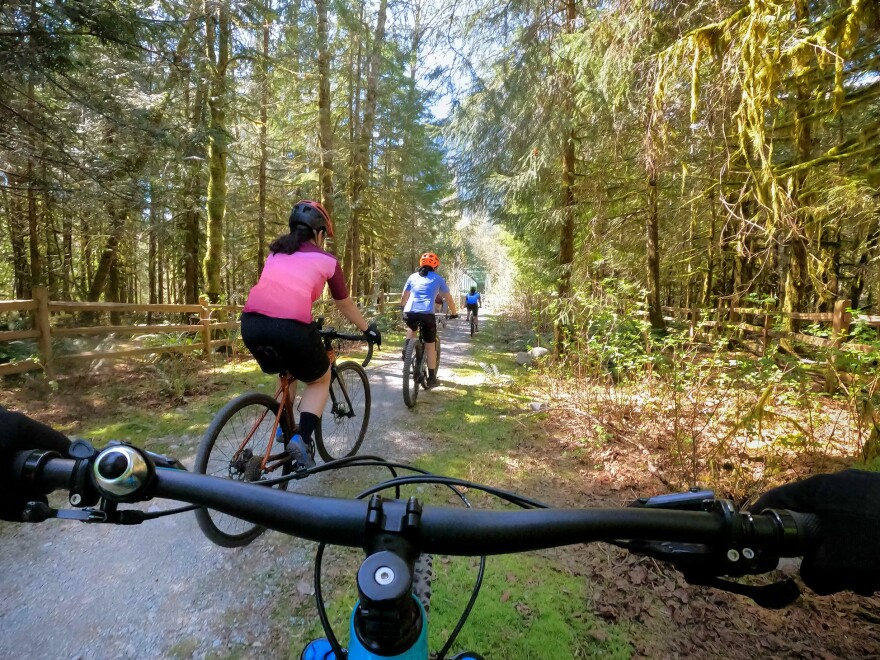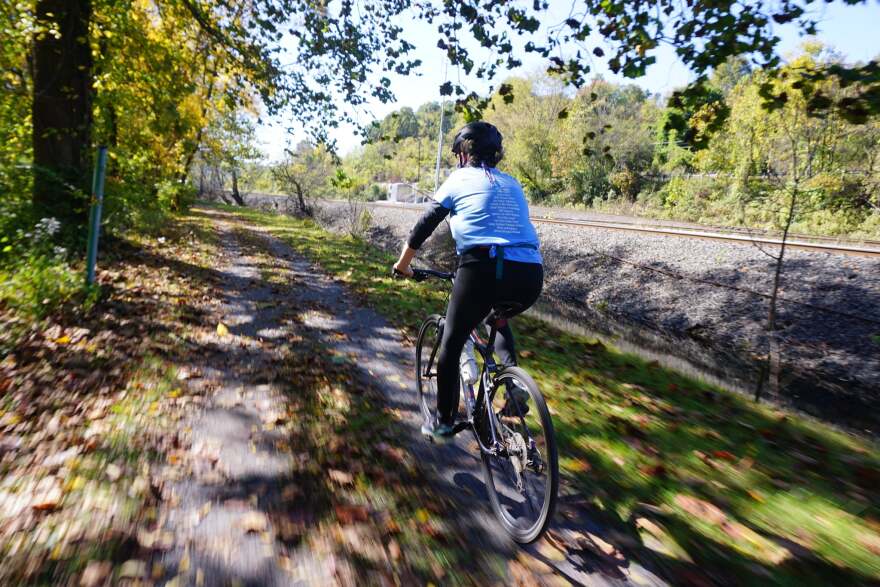ALLENTOWN, Pa. — There are some bike and shared-use lanes in the city, Yeimy Delgado said Tuesday, but they’re just not connected.
“They're in different areas throughout the city,” said Delgado, traffic superintendent for the city’s Bureau of Traffic Planning and Control. “We're looking for that connectivity for the bike users throughout the city –- at least have a plan that we can look at and work towards.”
The city was one of less than a dozen municipalities across Pennsylvania to share $255,000 in state grant funding to improve walking and biking trails for residents. Awarded through the WalkWorks program, officials now have $35,000 and a year to create an Active Transportation Plan aimed at bolstering connectivity citywide.
WalkWorks helps communities improve public health by reducing the risk of injury and death in traffic and increasing opportunities for everyday physical activity.Samantha Pearson, coordinator of the WalkWorks Program
“Our goal is safe, accessible, and inviting transportation options for all,” said Samantha Pearson, coordinator of the WalkWorks Program, in a news release at the time of the announcement. “WalkWorks helps communities improve public health by reducing the risk of injury and death in traffic and increasing opportunities for everyday physical activity.
“We are making strides in adjusting our surroundings to make them pro-access, pro-activity and pro-health. Our collaboration can lead to healthier people, more resilient communities, safer streets and roads, and stronger local economies.”
‘Drawing people to nature’
While the grant is facilitated through the WalkWorks program, there are several state departments supporting it, including: the state Department of Health, the Pennsylvania Downtown Center and the state Department of Conservation and Natural Resources.
The grants were funded by the Centers for Disease Control and Prevention’s Preventive Health and Health Services Block Grant program, and from the state DCNR’s Environmental Stewardship Fund.
Now that the grants are awarded, recipients such as Allentown are tasked with creating an Active Transportation Plan to improve biking and walking trails. To do this, state officials are advising local leaders to work with “transportation and community planners to collect data, assess current conditions and aspirations and incorporate public input.”
We know that people who spend time outdoors are healthier both physically and mentally, and we are also seeing boosts to local economies through the impact trails are having on local tourism across the commonwealth.Cindy Adams Dunn, secretary of the state DCNR
“Improving access to trails and creating safer opportunities to spend time outdoors is critical in drawing people to nature,” said Cindy Adams Dunn, secretary of the state DCNR. “We know that people who spend time outdoors are healthier both physically and mentally, and we are also seeing boosts to local economies through the impact trails are having on local tourism across the commonwealth.
“The WalkWorks program is essential in helping connect people to the outdoors in their home communities, which is why we are excited to continue this partnership with the Department of Health and the Pennsylvania Downtown Center.”
While this is the most recent round of funding received by Allentown, it follows at least two other awards so far this year.
Over the last several months, the city has seen an infusion of state and federal funding to extend and improve trails, as well as to make the city safer for pedestrians and bicyclists.

In late March, the city got $500,000 from the Commonwealth Financing Authority’s Multimodal Transportation Fund, or MTF, to extend the MLK Trail off Martin Luther King Jr. Drive and replace traffic signals at three intersections along 17th Street. When complete, it will connect Lehigh Parkway to Fountain Park.
City officials, alongside local legislators, the next month announced the Safe Streets for All project. Funded by a $312,000 grant from the U.S. Transportation Department, a steering committee will analyze streets’ safety and develop a “holistic approach” and “roadmap for safety improvements.”
The project was announced after a deadly year on city roads.
More than 4,000 crashes were reported in 2023, including 136 that involved pedestrians, according to city statistics. Five pedestrians were killed, and a dozen others seriously injured.
Residents can complete an online survey to highlight problem areas.
‘Establish a connection’
The WalkWorks program is a separate initiative from the trail expansion and Safe Streets for All projects, Delgado said. The former includes a master plan for trails through the city, while the latter has an overall goal for safety.
But data gleaned and lessons learned from both will help inform the Active Transportation Plan.
“We anticipate that we will use some sections of trails to kind of connect to our bike network. And, that's ultimately the goal — connection,” Delgado said. “This is more specific to bike usage and connectivity throughout the city, and it will be a supplement to [Safe Streets for All program.]
“That's looking at overall making streets safer and more accessible to all, versus this is just focused to help us connect their bike infrastructure throughout the city.”

Asked if officials already know how much bike infrastructure is already in place, Delgado said, “The short answer is no.”
“A lot of what’s already out there was done years back,” Delgado said, adding he’s been working with the city for about a year. “We’re trying to gather what we already have out there and what data we have within Public Works.”
After the inventory is complete, officials will be able to see the gaps and work to connect them.
“Since we do not have that much going on in terms of bike lanes and bike facilities in general, we’re going through it with an open mind to see which streets are the most open to including these type of bike infrastructures, whether they're shared shared lanes or bike lanes or protected bike lanes,” Delgado said. “See which roadways throughout the city would accommodate that.
“And also, our overall goal is to kind of establish a connection between north and south and east and west. So, for this plan, we kind of look into, see which roadways would work the best to reach that goal if it is feasible.”
Officials are also looking for input from residents and are planning community stakeholder engagement sessions in August and September, but they are yet to be scheduled.
A draft plan is expected April 30 to garner feedback from residents, with a June 30 deadline for plan adoption by the governing body.


